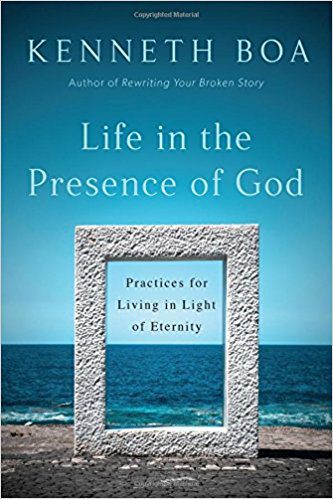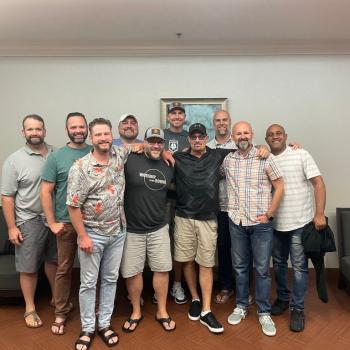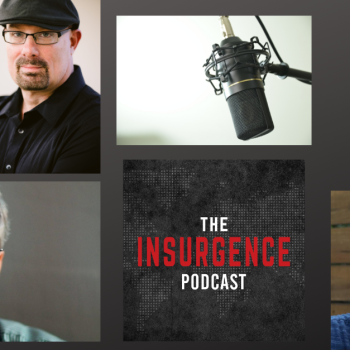Today I interview Kenneth Boa, the author of the superb new book, Life in the Presence of God.
It’s rare that I come across a kindred spirit in the area of knowing the Lord. But Ken is one of those rare souls.
I highly recommend his book, Life in the Presence of God.
The book is so good I added it to my 100 Best Christian Books List.
Anyways, here is Part 2 of my interview with Ken.
Enjoy!
Where in Scripture and in Jesus’ life in the Gospels do we find Jesus meditating/ contemplating and being silent in God’s presence? We see Him going away alone to pray, but how do we know prayer isn’t just talking to God and listening to His voice? Where do we find things like meditation, contemplation, breathing, and silence in His life and in the rest of the Bible?
Ken Boa: We know that solitude and silence were part of the Lord’s life from the following Scriptures (two of the most poignant ones are in bold):
Then Jesus was led up by the Spirit into the wilderness (Matthew 4:1)
Now when Jesus heard about John, He withdrew from there in a boat to a secluded place by Himself . . . (Matthew 14:13)
Immediately the Spirit impelled Him to go out into the wilderness. (Mark 1:12)
In the early morning, while it was still dark, Jesus got up, left the house, and went away to a secluded place, and was praying there. (Mark 1:35)
And He said to them, “Come away by yourselves to a secluded place and rest a while.” (For there were many people coming and going, and they did not even have time to eat.) They went away in the boat to a secluded place by themselves. (Mark 6:31–32)
Jesus, full of the Holy Spirit, returned from the Jordan and was led around by the Spirit in the wilderness. (Luke 4:1)
When day came, Jesus left and went to a secluded place; and the crowds were searching for Him . . . (Luke 4:42)
But Jesus Himself would often slip away to the wilderness and pray. (Luke 5:16)
And it happened that while He was praying alone, the disciples were with Him. (Luke 9:18)
To be obedient to the Scriptures, Jesus’ prayer life must have included meditation, since this is mandated in the Hebrew Bible. Relevant Old Testament passages include Psalm 46:10 (“Be still, and know that I am God . . .”) and Isaiah 30:15 (“In repentance and rest you will be saved, in quietness and trust is your strength”).
Also, see Psalm 27:8, Psalm 42:1–2, and Psalm 63:1. The first of these urges us to approach God less as an object or intellectual construct and more as a personality with whom we have an ongoing encounter and communion.
These points are further elucidated in Conformed to His Image (Zondervan, 2001), Facet 6: Devotional Spirituality, especially the chapter on “The Contemplative Way” (chapter 14).
Here are some quotes from there and from chapter 15 (which talks about the practice of sacred reading, or lectio divina):
- “Followers of the contemplative approach make the love of God their supreme and unrivaled object in life. This hunger and thirst for righteousness is the soul’s love affair with its summum bonum, the highest good for which it was created. This involves both contrition (broken-heartedness) and cherishing (worshipful attention). It is a shifting of the center of focus so that the gaze of the heart is turned away from ourselves to the Triune God. It is the gradual development of a spiritual reflex so that we experience the liberty of the single, clear eye that is steadily fixed on Jesus (Luke 11:34; Hebrews 12:2).” (p. 166)
- [After quoting Psalm 123:1–2]: “Although the contemplative approach to Christian spirituality involves disciplines of renewing the mind and engaging the will, it is primarily an experiential way of the heart. It travels the mysterious path of realized fellowship with God through experiences of personal, loving, and intimate perception.” (p. 167)
- “While we come to love God by knowing Him, it is just as true that we come to know God by loving Him. Contemplative prayer seeks to apprehend God through love and faith in such a way that theology is not merely speculative but lived.” (p. 167)
- “Contemplation is often confused with meditation, but as we will see, they are not synonymous. Meditation and the prayer that flows out of it bring us into communication with the living and transcendent Lord, and as such, they prepare us for contemplation. Meditative prayer should be more than an intellectual exercise; when it is accompanied by affective intention it leads to the love and communion of contemplative prayer. Because of its very nature, it is notoriously difficult to communicate the characteristics of contemplative prayer. It is a mysterious territory in which the language is silence and the action is receptivity. True contemplation is a theological grace . . . . When he witnessed the miracle of the transfiguration of Jesus on the holy mountain, the awe-struck Peter inappropriately broke into speech and was silenced by the voice out of the cloud that said, ‘This is My beloved Son, with whom I am well-pleased; listen to Him!’ (Matthew 17:4-5). When we enter into the numinous territory of contemplation, it is best for us to stop talking and ‘listen to Him’ in simple and loving attentiveness.” (p. 182)
Many young people today who are Christians are absorbed with trying to make the world a better place by involving themselves in various activist movements. Others are driven to put all of their efforts and energy into evangelism. Yet a small percentage of both camps know little about experiencing God’s presence or living the indwelling life of Christ. Why do you think this is and what would you say to such young people who are reading this interview?
Ken Boa: There’s a danger for any activity to occlude intimacy. That activity can be evangelistic and ministry-focused, or it can be focused on this-world causes. Both camps can fall into the trap of becoming overly focused on the visible rather than the invisible. Both may view acts of devotion that are intended to cultivate intimacy as nonproductive. From the world’s standpoint, they are; the results of a deepening relationship with God—or with anyone—are not always measurable or obvious, especially at first. But over time, intimacy will energize and animate, and action will be its natural outflow. The end goal is knowing God for his own sake, though, so we all must be careful not to let productivity of any kind replace or take priority over our relationship with him.
As I pointed out in an earlier question, it’s very common for high-level entrepreneurs who aren’t Christians to meditate in the mornings. Their form of meditation is strikingly similar to contemplative prayer and centering prayer, only they don’t use a sacred word like “Jesus” or “Lord,” since some of them are atheists. Yet they all declare how it benefits them. Seeing that none of these people are Jesus-followers and thus don’t have the indwelling Spirit, how do you explain why and how meditation benefits them?
Ken Boa: As I said earlier, these people are onto something. We’re made to need rest, to slow down and reflect. It’s no surprise, then, that even an atheist experiences some benefit from these practices that our Creator has made us to need. But for them, it’s an I/It instead of an I/Thou; they’ve replaced an impersonal dynamic or entity for Jesus as the object of their meditation. Thus, they’re not enjoying the full richness and eternal benefit that they could. The benefits will be limited (unlike meditation on the infinite, boundless, personal God), and they will not last beyond this lifetime.
Tell us about the prequel you’ve written that preceded this one. What is it about and what is the main point?
Ken Boa: Rewriting Your Broken Story, published by InterVarsity Press in 2016, was about the power of an eternal perspective. We all experience some degree of brokenness in our lives on earth, and the only wise and meaningful response is to see ourselves as embedded in the greatest story ever told—placing our smaller stories within his larger story, which we know ends well. The question this book inevitably raised was how does one develop such a perspective? Many have an erroneous notion that only a few believers can actually attain this type of perspective and live by it. But throughout Scripture, we see no category of “super-spiritual” people; there are only “ordinary” followers of Jesus, and all of us are called to bring this kind of view to bear on our earthbound existence. We’re amphibious beings, both spiritual and physical, and with training and practice, anyone can integrate both with increasing frequency. This doesn’t require hiding ourselves away in a prayer closet, but it does require that we become intentional. Life in the Presence of God is the answer to that “how” question.
What will your next book be about?
Ken Boa: I am working on my proposal now for After You Have Suffered for a Little While: Preparation for Our Eternal Home. This book is the third in this trilogy focused on living with an eternal perspective. Moving on from a focus on the internal aspect (and challenges) to learning how to live in and enjoy God’s presence, this next book will consider a primary external force that can threaten that intimacy: suffering. The book is anchored in my recent teachings on Peter’s first epistle, which was written in the context of growing persecution and suffering of all kinds, perhaps not unlike a situation we Americans should be preparing for today. Others have written eloquently on suffering, and this book will not seek to reproduce what’s already been written. But rather than focus on the questions of why God allows suffering and how we can endure/cope with it, this book will focus on its soul-shaping purpose, as God’s gracious tool to prepare us for our eternal destiny.
Putting all of your knowledge and experience together, what are the top 3 lessons you would pass on younger people about experiencing God’s presence … things that will guide their life for years to come.
Ken Boa: First, I would emphasize that experiencing God’s presence is more about intention than time. Even having a specific time in your day set aside for devotions doesn’t guarantee you’ll experience his presence, because, unfortunately, people rarely connect what happens in that devotion time to the rest of their day. Believe me, I am a huge fan of “quiet times” and devotional tools (of which I’ve produced many), but if we never connect these times and tools to the bulk of our days, what good are they? We have to bring God’s truths to bear on all of life, heeding Colossians 3:23 to do everything (“whatever you do”) for God, as our audience of One, and not for other people.
Second, no one method will enable you to experience God’s presence. There are many methods, no magic pills. You can be creative! God is never boring or dull; you can’t out-dream or out-imagine his kingdom. He’s always more interesting and exciting in the long run.
Third, obedience-based discipleship is critical to the Christian life. Jesus told his disciples, and us, to make disciples, not converts, “teaching them to observe all that [He] commanded” (Matthew 28:20). Young people have a hard time trusting figures of authority, and I understand that; I was in that place, too, once. But there’s One you have to learn to trust (see John 15:21–23). He is completely trustworthy, and the best decision you can make is to surrender to his loving presence. He is the wellspring of life, the lodestar by whom all of life comes together and makes sense. He wants to live his life in you, manifesting himself through you. This is impossible for us to grasp: that the one who is both immanent and transcendent wants to live in us! It’s the most robust way to live, and when you live this way, you’ll be empowered to do what he’s called you to do at the point of action.














